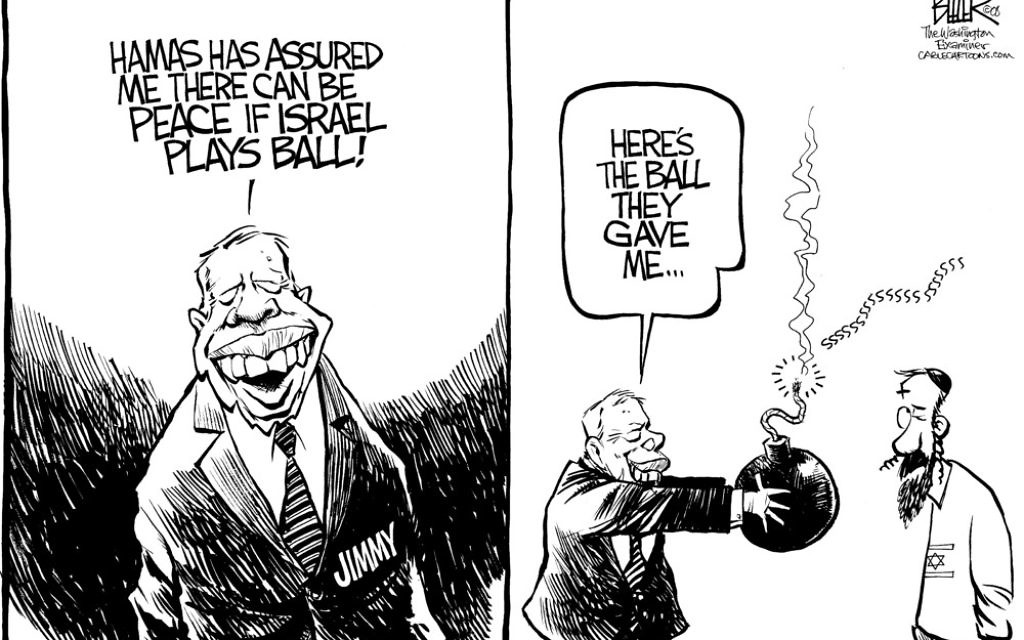Jimmy Carter’s Broken Record

Ten years ago in November, Jimmy Carter released his notorious book “Palestine Peace Not Apartheid,” burning bridges with many, such as AJT contributor Kenneth Stein, who know the Middle East far better than the former president does.
Then as now, Carter reveled in the role of the wise old statesman and never let inconvenient facts get in the way of his version of truth.
The AJT spent much of the next year refuting what he wrote and what he said in appearances from “The Daily Show With Jon Stewart” to a conference at UGA marking the 30th anniversary of the start of his failed presidential administration to his annual spring address at Emory.
Get The AJT Newsletter by email and never miss our top stories Free Sign Up
That Athens conference in January 2007 celebrating — yes, celebrating — his administration was a real-life exercise in alternative history, during which Carter was hailed as a great president who would have beaten Ronald Reagan in 1980 if not for his many noble, principled actions: the Panama Canal Treaties; the boycott of the 1980 Summer Olympics; the response to the energy crisis; the economic policies that buried us under soaring inflation, unemployment and interest rates. Pay no attention to the Iranian hostage crisis behind the curtain.
Two things stick with me from that conference: Carter administration veteran Stuart Eizenstat’s “no comment” about the book and Carter’s annoyance that people kept adding a colon to his book title. He insisted it should be “Palestine Peace Not Apartheid.”
The AJT won a national Rockower Award from the American Jewish Press Association for our reporting and commentary in response to the book, but I don’t remember what we wrote. I just remember the fear that all our words were worse than worthless — that we played into Carter’s hands, keeping his book in the public eye and making him appear to be the victim of a vast media conspiracy.
Nonetheless, to paraphrase the man who ended Carter’s political career but, like Darth Vader striking down Obi-Wan Kenobi, somehow managed to make him more powerful than anyone could have imagined in 1980, there he and I go again.
On Monday, Nov. 28, Carter published a column in The New York Times in which he called on President Barack Obama to recognize Palestine as a state before leaving office Jan. 20.
It’s useless to rebut Carter point by point, but I have two suggestions for anyone open-minded about this conflict:
- Look at a map of the settlements rather than the numbers of settlers to judge whether continuing construction (including in Jerusalem) is destroying the chances for a two-state solution.
- Consider whether the wording of U.N. Resolution 242 in 1967, calling for “withdrawal of Israel armed forces from territories occupied in the recent conflict,” has the meaning Carter promotes — the withdrawal of all Israelis from all occupied territories.
What is worth a response is Carter’s vision of the future. He argues that if only a vaguely defined place called Palestine gains U.S. recognition, a process will fall into place that will produce what most American and Israeli Jews want: two states living side by side in peace.
It’s as unrealistic as thinking that a boycott of the Moscow Olympics would persuade the Soviet Union to withdraw from Afghanistan.
Carter remains fixated on the idea that the obstacle to peace is Israel, period.
But Israel could withdraw tomorrow from every inch of the West Bank outside Jerusalem, and it wouldn’t bring peace. It wouldn’t end hatred of Israel or halt the boycott, divestment and sanctions movement. And it wouldn’t give Israel a Palestinian partner with the strength of Carter’s old friend Anwar Sadat — someone able to drag his people into peace, even at the risk of his own life.
Carter’s prescription of U.S. recognition of Palestine isn’t a cure for what ails the Palestinians and Israelis; it’s just a placebo to make him and like-minded Americans feel better about themselves.
(Update: Speaking of people who know the Middle East better than Carter does, here’s veteran diplomat Aaron David Miller explaining in more detail why the ex-president is wrong.)





comments